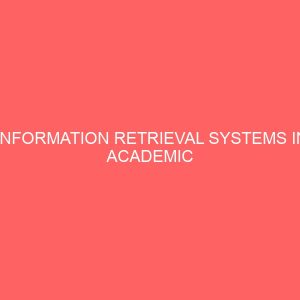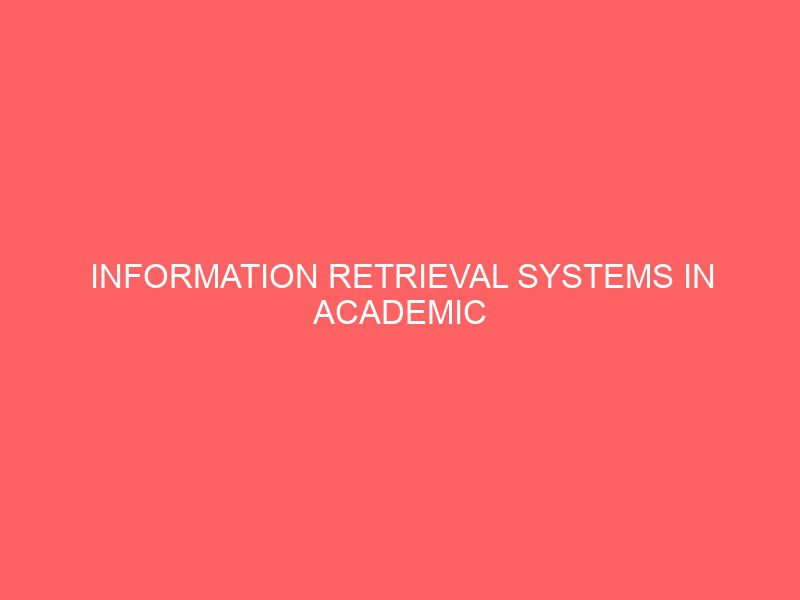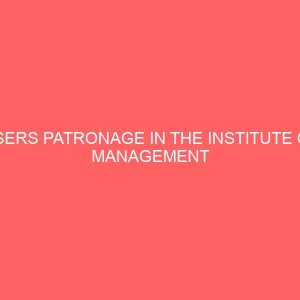Description
CHAPTER ONE
INTRODUCTION
1.1 BACKGROUND TO THE STUDY
This research is on Information retrieval systems in academic libraries (a case study of federal polytechnic, nekede owerri).
Information is a basic human need. It is needed in all facts of human endeavour. No society and libraries can function effectively without the intensive of information whether in print or non-print format.
It is therefore pertinent to know how this information can be retrieved and disseminated for use by the users or the society in a modern world. The different systems of information retrieval in academic libraries are therefore discussed in this write up with special interest on Federal Polytechnic Library Nekede, Owerri.
The world in information cannot be mentioned in isolation of human beings. Information has been described as the master resource, the chief raw material and the principle product on modern economic. Even before the modern world, the ancient world has been dealing with information gathering, storage and retrieval which were done in an ancient way where papyrus, clay tablets e.t.c. were used.
Information can be seen as data that have be subjected to functions capable of answering a users query, be it recorded, summarized or simple collection that would help in decision making, according to Uwem, (2008) defined information as a finished product ready for use, the source and medium of communication not with sanding information therefore, can help to ensure the effective use of other resources when it gets to the right people and at the right time.
Consequently, the basic objective of any library be it academic, public, school or special library includes the acquisition of information, surveying materials properly processing, organizing, storing and retrieving for disseminating such information to interested users. Hence every academic libraries whether the limits of its fund, develop sufficient information both in scope, nature and size to support the users information needs and aspiration will largely depend on a specific question and its ability to supply known information are produced in form of language even to retrieve information is inform of language, most times, the users found it increasingly difficult to cope with the basic problems of accessing particular information items for use.
This research purpose to investigate the various system adopted by the academic library under study in retrieving for use known information items when needed and to retrieve documents on a particular subject problem and questions encountered.
1.2 STATEMENT OF THE PROBLEM
The period under review in this research work is of great importance in academic libraries. It is a period of technological information explosion.
This is a period when many retrieval systems exists, where more efficient and accurate retrieval system has been developed like computer and internet which links different but many stations together.
However, there are basic problems which militate against the efficient utilization of these resources and these problems include.
a. Lack of funds
b. Government apathy to academic libraries
c. Low literacy level in Nigeria
d. Poor computer informed staff in the academic libraries.
1.3 Objective of the study
In order to evaluate information retrieval system in Federal Polytechnic Library Nekede, Owerri, the following objectives are to be focused.
i. To identify the existence of information retrieval system in the library.
ii. To know how information resources are organized in the library in its retrieval effort.
iii. To identify the problems encountered by the library in its information retrieval effort.
iv. Identify the process on how information retrieval system are improved in the library.
v. To highlighting the changes of information retrieval system in the library.
1.4 SCOPE OF THE STUDY
This study is limited to the information retrieval processes in academic libraries. This study is further narrowed down to academic libraries and specific focus on Federal Polytechnic Library Nekede. The different information retrieval processes were reviewed with unique interest in the libraries as it applies to the library under study. This library was chosen so as to evaluate the developments and the changes that have taken place in the library under study as regards to information retrieval system.
1.5 SIGNIFICANCE OF THE STUDY
This study is significant because there is no society that can function without information. So information can only be relevant when it gets to the right people at the right time and in the right dosage. It is sine-qua-non to library users, librarians, administration and the entire society.
1.6 RESEARCH QUESTION
What are the extent of information retrieval system used in Federal Polytechnic Library Nekede?
ii. How does Federal Polytechnic Library Nekede, organize their materials in the library.
iii. What are the problems of information retrieval systems in the library?
iv. How does information retrieval systems improve in the library?
v. Do they have changes in information retrieval system in the library?







